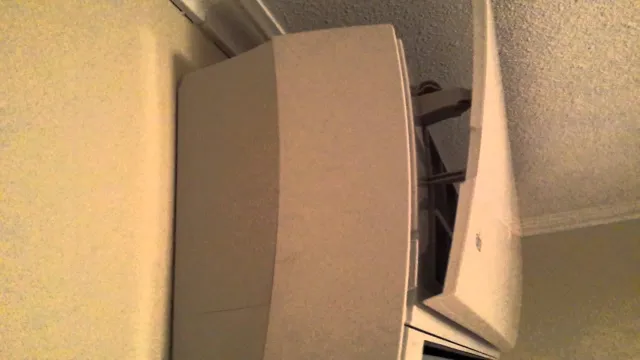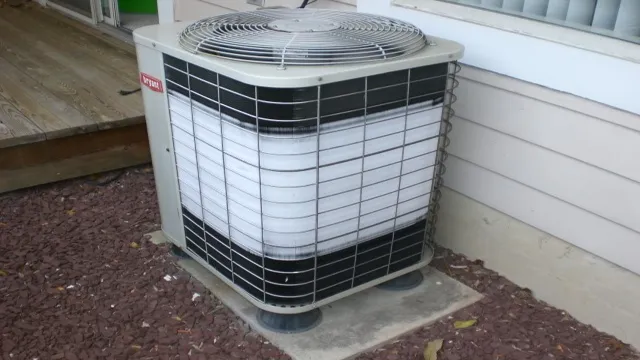Have you ever noticed your mini-split air conditioner icing up? It can be a frustrating and concerning issue, but why exactly is it a problem? Not only does it indicate that there is an issue with your system, but it can also lead to decreased efficiency and increased energy costs. Furthermore, excessive icing can even cause your unit to shut down altogether. In this blog, we’ll explore why mini splits icing up is a problem and what you can do to prevent it from happening.
So, strap in and let’s dive into the world of mini-split air conditioners!
Understanding Mini Splits
If your mini split system is icing up, it could be a sign of a few different issues. One possible cause is a dirty air filter, which can restrict airflow and cause condensation to build up on the coils. Another common culprit is low refrigerant levels, which can prevent the system from properly removing heat and lead to excessive moisture buildup.
In some cases, inadequate insulation or an improperly sized unit may also contribute to icing problems. It’s important to address any icing issues promptly, as they can reduce your system’s efficiency and even lead to more serious damage over time. A professional technician can help diagnose and resolve the underlying problem, restoring your mini split system to full functionality.
What Causes Icing Up?
Mini split AC systems have grown in popularity due to their energy efficiency and affordability. However, like all air conditioning units, they are not impervious to issues such as icing up. Ice buildup occurs when there is an insufficient amount of airflow passing over the evaporator coils, causing moisture to accumulate and freeze.
A common cause of icing up is dirty air filters or blocked air ducts. This can impede the movement of air and cause the system to work harder to produce cool air. Another cause of icing up could be a refrigerant leak, which can reduce the amount of refrigerant in the system and cause the coils to freeze.
It is essential to seek professional help to diagnose and fix the problem to prevent further damage to the unit. Regular maintenance, such as cleaning air filters and performing routine tune-ups, can help prevent icing up and extend the life of the system.

Why You Shouldn’t Ignore It
Mini splits are becoming an increasingly popular option for heating and cooling homes. But what exactly are mini splits, and why should you consider them for your home? Essentially, a mini split is a type of HVAC system that doesn’t require ductwork. Instead, it consists of an outdoor compressor unit and one or more indoor air handlers that are mounted on the wall.
Because they don’t require ductwork, mini splits are perfect for homes that don’t have existing ductwork or that have limited space in the attic or crawl space. Additionally, mini splits are highly efficient and can save you money on your energy bills. So if you’re in the market for a new HVAC system, don’t overlook mini splits as a viable option for your home.
How to Stop Your Mini Split from Icing Up
Mini split systems are a popular way to heat or cool a room or specific area of the home. However, when they start to ice up, it can be a real problem. There are several reasons why your mini split system may be icing up.
It could be due to a dirty filter, a defrost control failure, low refrigerant levels, or a malfunctioning thermostat. Regular maintenance is the key to preventing your mini split system from icing up. Checking and cleaning the filters on a regular basis is important to ensure that the system can breathe properly.
Additionally, it is important to make sure that the coils are not blocked or obstructed. If you notice that your mini split system is icing up, turn it off and allow it to thaw completely before turning it back on. If you continue to have issues with your mini split system icing up, it may be time to call in a professional for help.
They can diagnose and repair any issues that are causing the icing up and get your system running smoothly again.
Check the Air Filter
If you’re noticing your mini split system is frequently icing up, there may be a simple solution. Check the air filter! A dirty or clogged air filter can cause insufficient airflow, leading to ice buildup on the indoor unit. This can be easily remedied by cleaning or replacing the air filter.
It’s important to check and clean the filter regularly, especially during periods of heavy use. Neglecting this maintenance can lead to decreased efficiency and potentially costly repairs down the line. Think of it like changing the oil in your car – it’s a small but crucial task to keep everything running smoothly.
So if your mini split is struggling with ice buildup, start with the filter and see if that makes a difference.
Clear the Drain Line
Mini Split, Icing Up, Drain Line Mini splits are an amazing invention that keeps us cool during hot summers and cozy during cold winters. However, like any other appliance, they sometimes develop issues. One major problem that almost everyone who owns a mini split has experienced is when it ices up.
There are a lot of reasons why it happens. It could be because of a low refrigerant charge, a faulty motor, a dirty air filter, etc. But the most common cause is a clogged or dirty drain line.
The drain line is responsible for carrying the condensation away from the unit. When it becomes blocked, the water can’t flow, builds up, and eventually freezes. To clear the drain line, locate the pipe that connects to the unit and flush it out using a vacuum or wet/dry vac.
You can also use a mixture of bleach and water to clean it. By doing this, you can stop your mini split from icing up and get it back to its optimal performance.
Inspect the Coils
One common issue with mini split systems is icing up, which can cause a loss of cooling or heating efficiency, as well as increase the risk of damage to the system. One of the potential causes of this problem is dirty or clogged air filters, which restrict airflow over the evaporator coils and lead to ice formation. However, if the filters are clean and the problem persists, another possible culprit is dirty or damaged coils.
Inspecting the coils regularly can help detect any signs of dirt, grime, or corrosion. If you notice any dirt buildup or damage to the fins of the coils, it’s crucial to clean them properly or replace them to ensure optimal system performance and prevent further issues. Keeping your mini split free from icing up requires regular maintenance and attention to detail, including cleaning the coils, changing the air filters, and scheduling professional tune-ups to avoid any potential problems that may arise.
When to Call a Professional
Mini split air conditioning units are a great investment for keeping your home cool. However, if you notice that your mini split system is icing up, it might be time to call a professional. While it’s normal for a mini split system to produce a small amount of ice, excessive amounts could mean there’s a more serious issue at hand.
One common reason for icing up is a dirty air filter or blocked air flow, which can restrict the flow of air and cause the evaporator coil to freeze. Another reason could be a refrigerant leak, which requires a professional to repair. In either case, it’s important to address the issue as soon as possible to prevent further damage to your system.
So if you notice a buildup of ice on your mini split system, don’t hesitate to call a professional for help.
Signs You Need Professional Help
Recognizing when you need professional help can be challenging, but it is essential to ensure your well-being. Whether it’s a mental health issue, a legal problem, or a technical glitch, seeking help from a professional can save you time, money, and effort in the long run. If you find yourself struggling with overwhelming stress, anxiety, or depression, a licensed therapist can offer support and guidance to help you cope.
Similarly, if you’re facing a legal dispute or a complex legal issue, a skilled attorney can provide expert advice and representation to protect your rights and interests. And if you’re dealing with a computer virus or a malfunctioning device, don’t hesitate to call a tech expert. Remember, seeking professional help doesn’t make you weak; it shows that you’re taking proactive steps to address your challenges.
So, don’t wait to call a professional when you need one; it could be the best decision you ever make.
Benefits of Hiring a Professional
Knowing when to call a professional can save you time, money, and avoid potential aggravation. Whether it’s fixing a leaky faucet, repairing your car, or handling a legal matter, there are moments when it’s best to leave it to the experts. A professional has the experience, tools, and knowledge to get the job done right the first time.
You might think that DIY is a great way to save money, but without the proper skills, you may end up causing more harm than good. Not to mention, the frustration and annoyance that can result from failed attempts. Hiring a professional can not only provide a quick resolution but can also be an investment in the future, ensuring that the job is done correctly and safely, giving you peace of mind.
So, when in doubt, it’s best to call a professional who can handle the task like a pro.
Conclusion
In the world of HVAC, mini split icing up is the equivalent of a brain freeze – annoying and uncomfortable, but ultimately a temporary inconvenience. Like how sipping your frozen drink too quickly can cause a headache, inadequate airflow or low refrigerant levels in a mini split system can cause the evaporator coil to ice up. But fear not, with proper maintenance and care, mini split icing up can be prevented and your home will be comfortable year-round.
So stay cool, my friends, and remember to take things slow and steady, just like sipping a frozen drink. “
FAQs
Why is my mini split icing up?
Your mini split could be icing up due to a variety of reasons, including a dirty air filter, low refrigerant levels, or a malfunctioning fan. We recommend contacting a professional to properly diagnose and fix the issue.
Can I prevent my mini split from icing up?
Yes, you can prevent your mini split from icing up by regularly cleaning or replacing the air filter, scheduling routine maintenance with a professional, and ensuring the unit is properly sized for the room it is cooling/heating.
How does low refrigerant cause my mini split to ice up?
Low refrigerant levels can cause the evaporator coil to become too cold, leading to condensation freezing on the coil and causing ice buildup.
What can I do if my mini split is already iced up?
If your mini split is already iced up, turn off the unit and wait for the ice to thaw. Afterwards, check the air filter and refrigerant levels. If the issue persists, contact a professional for further assistance.

